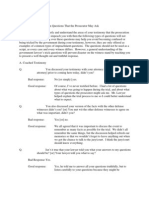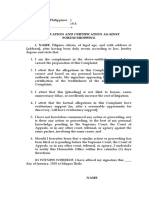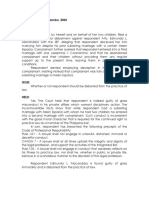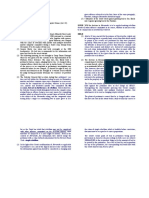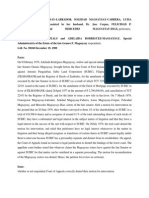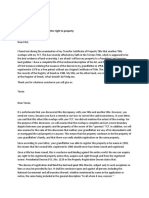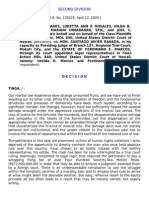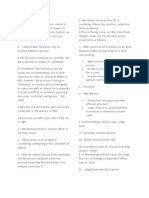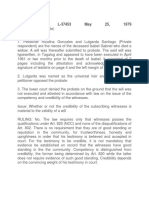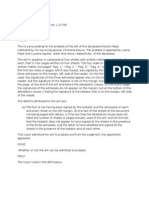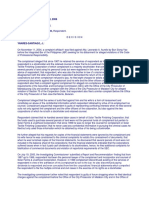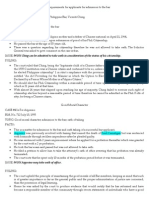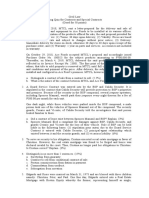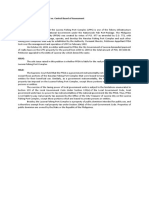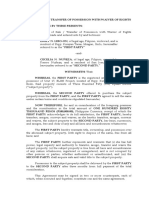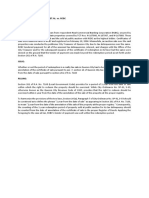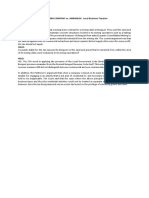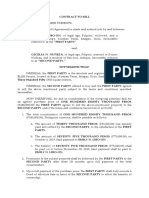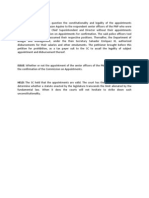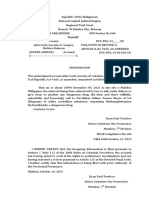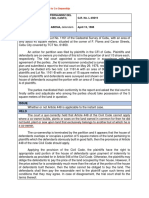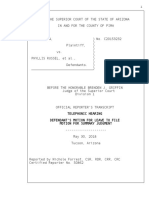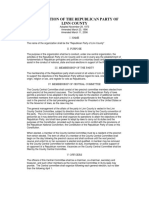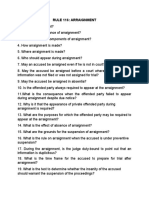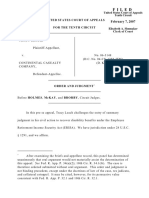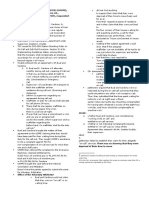Digests - Ethics Canon 7-9
Digests - Ethics Canon 7-9
Uploaded by
onlineonrandomdaysCopyright:
Available Formats
Digests - Ethics Canon 7-9
Digests - Ethics Canon 7-9
Uploaded by
onlineonrandomdaysOriginal Description:
Original Title
Copyright
Available Formats
Share this document
Did you find this document useful?
Is this content inappropriate?
Copyright:
Available Formats
Digests - Ethics Canon 7-9
Digests - Ethics Canon 7-9
Uploaded by
onlineonrandomdaysCopyright:
Available Formats
In re: Ramon Galang Facts: 1.
This case involved the re-evaluation and re-checking of the answer booklets of Ramon Galang in Political Law and Public International Law, Civil Law, Criminal Law, Mercantile Law, and Remedial Law. The issue was brought into cognizance by a particular Oscar Landico, a bar flunker in 1971 Bar Examinations. In the course of the investigation, it was found that it was the Bar Confidant, Atty. Victorio Lanuevo, who requested the bar examiners of every bar subject to re-evaluate and recheck the answers of Galang, whose code is 954. The examiners believed Lanuevo because they (the examiners) believed that he (Lanuevo) had the authority to do the same and that the examinee concerned failed only in his particular subject and/or was on the borderline passing. Due to such considerations, Galangs grade was 74.15%, and considered passed by the Supreme Cou rt. Moreover, upon the request of the Chairman of the 1971 Bar Committee, the NBI conducted an investigation. It was found that Ramon Galang (Romy Galang y Esguerra) was charged with the crime of slight physical injuries while he was still a student in the School of Law of Manuel L. Quezon University, sometime in 1959. He did not make mention of this fact in all his applications to take the bar examinations, which he is required under the rules to do. For this matter, Lanuevo and Galang were sought to be disbarred while the five bar examiners for disciplinary action.
3.
4.
2.
5.
3.
The re-evaluation by the Examiners concerned of the examination answers of Galang in 5 subjects, as already clearly established, was initiated by Lanuevo without any authority from the Court, a serious breach of the trust and confidence reposed by the Court in him a Bar Confidant. Consequently, the re-evaluation that enabled Galang to pass the 1971 Bar Examinations and to be admitted to the Bar is a complete nullity. The Bar Confidant does not possess any discretion with respect to the matter of admission of examinees to the Bar. He is not clothed with authority to determine whether or not an examinees answers merit re evaluation or whether what the Examiners appraisal of such answers is correct. And whether or not the examinee benefited was in connivance or a privy thereto is immaterial. What is decisive is whether the proceedings or incidents that led to the candidates admission to the Bar were in accordance with the Rules. What the Court now does with Galang is not without any precedent in this jurisdiction. The Court had on several occasions in the past nullified the admission of successful bar candidates to the membership of the Bar on the grounds, among others, of (a) misrepresentation of, or false pretenses relative to, the requirement of applicants educational attainment, (b) lack of good moral character, and (c) fraudulent passing of the Bar Examinations. Quingwa v. Puno
4.
Facts: 1. Atty. Armando Puno and Flora Quingwa were engaged to be married. On June 1, 1958, initially planned to attend a movie, Puno told Quingwa that, after they eat their refreshments at Silver Moon Hotel, they take one of the rooms. Puno for several times assured Quingwa that they were anyway engaged to be married. Before they entered the room, Puno registered and signed the registry book as Mr. and Mrs. A. Puno. Even though Quingwa was reluctant to have sex, she had no other choice but to submit to Punos demands. They had 2 rounds of sex. Their sexual intimacy resulted to a birth of a child 8 months later. After the said incident, she implored Puno to fulfil his promise to marry her. However, he refused to do so. Thus, Quingwa filed a verified complaint against Puno for gross immorality and misconduct.
Ruling: 1. The name of Ramon Galang should be stricken off of the Roll of Attorneys as a necessary consequence of the unauthorized re-evaluation of his answers in five major subjects. The judicial function of the SC in admitting candidates to the legal profession, which necessarily involves the exercise of discretion, requires: (a) previous established rules and principles, (b) concrete facts, whether past or present, affecting determinate individuals, and (c) a decision as to whether these facts are governed by the rules and principles. The determination of whether a bar candidate has obtained the required passing grade certainly involves discretion.
2.
2.
3.
Ruling: 1. One of the requirements for all applicants for admission to the Bar is that the applicant must produce before the Court satisfactory evidence of good moral character, as provided for by Section 2, Rule 127 of the old Rules of Court (now section 2, rule 138). If that qualification is a condition precedent to a license or privilege to enter upon the practice of law, it is essential during the continuance of the practice and the exercise of the privilege. When his integrity is challenged by evidence, it is not enough that he denies the charges against him; he must meet the issue and overcome the evidence for the relator and show proofs that he still maintains the highest degree of morality and integrity, which at all times, is expected of him. Even though Puno denied the allegations of Quingwa especially on him taking her to Silver Moon Hotel, he did not present evidence to show where he was on that date. Under the circumstances, the Court is convinced that the respondent has committed a grossly immoral act and has, thus disregarded and violated the fundamental ethics of his profession. Indeed, it is important that members of this ancient and learned profession of law must conform themselves in accordance with the highest standards of morality. As stated in paragraph 29 of the Canons of Judicial Ethics: The lawyer should aid in guarding the bar against the admission to the profession of candidates unfit or unqualified because deficient in either moral character or education. He should strive at all times to uphold the honor and to maintain the dignity of the profession and to improve not only the law but the administration of justice. Armando Puno was disbarred. Melendrez v. Decena Facts: 1. The spouses Melendrez availed a loan of Php 4,000, secured by a real estate mortgage from Atty. Decena. However, on the Real Estate Document, it was made to appear that the amount borrowed was Php 5,000 which he explained, after he was confronted by the spouses, that the document was mere a formality. His assurance was believed by the spouses and Narciso had the document notarized and gave the document to respondent.
2.
3.
2.
4.
3.
5.
4.
The spouses paid Php 500.00 for three months upon the exaction made by Decena. However, the spouses were no longer able to pay the loan due to financial reverses which led to the respondent preparing a Real Estate Mortgage over the same lot with an amount of Php 10,000 and an interest of 19% per annum on May 7, 1976. Moreover said mortgage document contained a provision, inserted by the respondent himself, that should the spouses fail to pay their obligations on or before May 30, 1976, the property would be sold at a public auction. Said provision was not explained to the spouses, who signed the said document upon respondents insistence. This was likewise notarized and submitted the copy to respondent. The spouses relied on the assurance of Decena that the second Real Estate Mortgage was but a formality, and neither bothered to ask from Decena the status of the lot nor tried to pay their obligations. For having failed to pay on the said date, respondent applied for extrajudicial foreclosure and due to compliance with the requirements set by Act No. 3135, the title was transferred to him. The lot was sold to a third person, Trinidad Ylanan for Php 12,000. Upon learning what had happened, complainants tried to raise the amount of Php 10,000 and went to the house of Decena on May 30, 1979 to pay their obligation. However, Decena did not accept the money and instead gave the spouses a sheet of paper which indicated that the total indebtedness had soared to Php 20,400. The sheet of paper was made in respondents own handwriting. For this, they instituted this action for disbarment on grounds of malpractice and breach of trust. Aside from the complaint filed by the spouses on the mortgaged property, respondent was also filed with a disbarment complaint for having compromised the estafa case filed against one Reynaldo Pineda.
Ruling: 1. The following acts of respondent: (a) making it appear on the real estate mortgage that the amount loaned was Php 5,000 instead of Php 4,000, (b) exacting grossly unreasonable and usurious interest, (c) making it appear in the second real estate mortgage that the loan extended has escalated to Php 10,000, (d) failing to inform the spouses of the import of the real estate mortgage documents and inducing them to sign those documents with assurances that they were merely for the purposes of formality, (e) failing to demand or refraining from demanding payment before effecting
2.
3.
extrajudicial foreclosure, and (f) failing to inform or refraining from informing complainants that the real estate mortgage had already been foreclosed and that the spouses had a right to redeem the foreclosed property within a certain period of time constitute deception and dishonesty and conduct unbecoming a member of the Bar. Generally, a lawyer should not be suspended or disbarred for misconduct committed in his personal or non-professional capacity. Where however, misconduct outside his professional dealings becomes so patent and so gross as to demonstrate moral unfitness to remain in the legal profession, the Court must suspend or strike out the lawyers name from the Roll of Attorneys. The nature of the office of an attorney at law requires that he shall be a person of good moral character. This qualification is not only a condition precedent to admission to the practice of law; its continued possession is also essential for remaining in the practice of law, in the exercise of privileges of members of the Bar. Gross misconduct on the part of a lawyer, although not related to the discharge of professional duties as a member of the Bar, which puts his moral character in serious doubt, renders him unfit to continue in the practice of law. In the instant case, the exploitative deception exercised by respondent attorney upon the complainants in his privilege transactions with them, and the exacting of unconscionable rates of interest, considered together with the acts of professional misconduct committed by respondent attorney, compel the Court to conviction that he has lost that good moral character which is indispensable for continued membership in the Bar. Thus, he was disbarred. Royong v. Oblena
3.
(Josefina was below 18), he limited himself to kissing and embracing and sucking her tongue. They had sex as Josefina reached 18. During the course of the trial, it was found that Oblena had an illicit relationship with Briccia Angeles, who was married. Moreover, when he (Oblena) knew that Briccia could not give him a child, he seduced Josefina.
Ruling: 1. Although it is a well-settled rule that the legislature (or the Supreme Court by virtue of its rule-making power) may provide that certain acts or conduct shall require disbarment, the accepted doctrine is that statutes and rules merely regulate the power to disbar instead of creating it, and that such statutes do not restrict the general powers of the courts over the attorneys, who are its officers, and that they may be removed for other than statutory grounds. The tendency of the decision of the Court has been toward the conclusion that a member of the bar may be removed or suspended from office as a lawyer for other than statutory grounds. Indeed, the rule is so phrased as to be broad enough to cover practically any misconduct of a lawyer. In the case at bar, the moral depravity of the respondent is most apparent. His pretension that before complainant th completed her 18 birthday, he refrained from having sex with her, so as not to incur criminal liability, as he himself declared and that he limited himself merely to kissing and embracing her and sucking her tongue, indicates a scheming mind, which together with his knowledge of the law, he took advantage of, for his lurid purpose. As held by the Court of Kansas, *t+he nature of the office, the trust relation which exists between attorney and client, as well as between court and attorney, and the statutory rule prescribing the qualifications of attorneys, uniformly require that an attorney be a person of good moral character. If that qualification is a condition precedent to a license or privilege to enter upon the practice of the law, it would seem to be equally essential during the continuance of the practice and the exercise of the privilege. So it is held that an attorney will be removed not only for malpractice and dishonesty in his profession, but also for gross misconduct not connected with his professional duties, which shows him to be unfit for the office and unworthy of the privileges which his license and the law confer upon him.
2.
Facts: 1. Atty. Ariston Oblena raped complainant, Josefina Royong. He had likewise threatened her and her family members with death should Josefina report the incident. Due to the coitus, Josefina gave birth to a baby. However, Oblena denied that he raped the complainant. Rather, on the said day Josefina claimed to have been raped, he went to the Commission of Civil Service to follow up his appointment as technical assistant in the office of the mayor of Makati and read the record of the administrative case against Buenaventure Perez. He admitted however that he had illicit relations with complainant but to avoid criminal liability for seduction
2.
3.
4.
5.
Respondents conduct though unrelated to his office and in no way bearing on his profession, has nevertheless rendered him unfit and unworthy of the privileges of a lawyer. Ones own approximation of himself is not a gauge to his moral character. Moral character is not a subjective term, but one which corresponds to objective reality. Moral character is what a person really is, and not what he or other people think he is. As former CJ Moran observed: An applicant for license to practice law is required to show good moral character, or what he really is, as distinguished from good reputation, or from the opinion generally entertained of him, the estimate in which he is held by the public in the place where is known. As has been said, ante the standard of personal and professional integrity which should be applied to persons admitted to practice law is not satisfied by such conduct as merely enables them to escape the penalties of criminal law. Good moral character includes at least common honesty. Respondent therefore did not possess a good moral character at the time he applied for admission to the bar. He lived an adulterous life with Briccia Angeles, and the fact that people who knew him seemed to have acquiesced to his status, did not render him a person of good moral character. His name was stricken from the Roll of Attorneys. In Re: Pelaez
2.
3. 4.
Supreme Court for any of the causes therein enumerated. It will be noticed that our statute merely provides that certain cause shall be deemed sufficient for the revocation or suspension of an attorneys license. It does not provide that these shall constitute only the causes for disbarment, or that an attorney may not be disbarred or suspended for other reasons. As a general rule, a court will not assume jurisdiction to discipline one of its officers for misconduct alleged to have been committed in his private capacity. But this is a general rule with many exceptions. The courts sometimes stress the point that the attorney has shown, through misconduct outside of his professional dealings, a want of such professional honesty as render him unworthy of public confidence, and an unfit and unsafe person to manage the legal business of others. The reason why such a distinction can be drawn is because it is the court which admits an attorney to the bar, and the court requires for such admission the possession of good moral character. Judgment of the CFI was affirmed. In Justice Johns dissenting opinion however, the suspension should have been for two years. Tolosa v. Cargo
Facts: 1. Complainant Jose Tolosa alleged that his wife, Priscilla, left their conjugal home and went to live with respondent District Citizens Assembly lawyer Atty. Alfredo Cargo. He has alleged that even the hospital expenses incurred by Priscilla were paid by the respondent; but, the respondent answered, by filing a Rejoinder, that he only gave Php 35.00 during Priscillas confinement. In his answer, respondent countered that Priscilla left the complainant due to the maltreatment, physical injuries and public humiliation she had suffered from complainant. In its findings, the Solicitor General found that the complainants charges of immorality were not sustained by sufficient evidence. However, respondent was unable to satisfactorily disprove some allegations directed against him, including: (a)his failure to avoid seeing Priscilla, (b) Priscillas being able to rent an apartment in Malabon whose owner is admittedly his friend and former client, (c) his failure to avoid going to Malabon to visit
Facts: 1. Atty. Vicente Pelaez was appointed as guardian of the minor Gracia Cabrera. As guardian of Cabrera, he came into possession of certain property, including the 20 shares of the E. Michael & Co., Inc. and 10 shares of the Philippine Engineering Co. Pelaez borrowed Php 2,800 from PNB Cebu and deposited with the said bank the shares of stock corresponding to the guardianship as guarantee to the loan, without the knowledge or consent of the CFI of Cebu. Pelaez was suspended by virtue of a decision of the CFI of Cebu. However, the case was elevated to the Supreme Court for full investigation of the facts involved and for the rendition of the appropriate order.
2.
2.
3.
3.
Ruling: 1. Section 21 of the Code of Civil Procedure provides that a member of the bar may be removed or suspended from this office as lawyer by the
4.
his friend, (d) his failure to avoid getting involved in various incidents involving complainant and Priscillas brother, and (e) his interest in seeing Priscilla in the evening she was confined in the FEU Hospital. The SolGen concluded that respondent had failed to properly deport himself by avoiding any possible action or behaviour which may be misinterpreted by complainant, thereby causing possible trouble in the complainants family which behaviour was unbecoming of a lawyer and an officer of the Court.
statements in the media in relation a proceeding. In his article entitled Tanod Scores SC for Quashing Graft Cases in the Philippine Daily Globe, Gonzales claimed that the rich and influential persons get favourable actions from the Supreme Court. Ruling: 1. The SC, as regulator and guardian of the legal profession, has plenary disciplinary authority over attorneys. The authority to discipline lawyers stems from the Courts constitutional mandate to regular admission to the practice of law, which includes as well authority to regulate the practice itself of law. Quite apart from the constitutional mandate, the disciplinary authority of the SC over members of the Bar is an inherent power incidental to the proper administration of justice and essential to any orderly discharge of judicial functions. The disciplinary authority of the Court over members of the bar is broader than the power to punish for contempt. Contempt of court may be committed both by lawyers and non-lawyers. Frequently, when the contemnor is a lawyer, the contumacious conduct also constitutes professional misconduct which calls into play the disciplinary authority of the SC. Where the respondent is a lawyer, the SCs disciplinary authority over lawyers may come into play whether or not the misconduct with which the respondent is charged also constitutes contempt of court. The disciplinary authority of the Court over members of the Bar is but corollary to the Courts exclusive power of admission to th e Bar. A lawyers is not merely a professional but also an officer of the court and as such, he is called upon to share in the task and responsibility of dispensing justice and resolving disputes in society. Raul Gonzales was suspended indefinitely until further orders from the Court. In re: Almacen Facts: 1. Atty. Vicente Raul Almacens client lost in a case with the Supreme Court, to what Almacen called as an unconstitutional and obnoxious practice of arbitrarily denying petitions or appeals without any reason. In his published statement in the Manila Times, he called the SC as one that is composed of men who are calloused to our pleas of justice, who ignore
Ruling: 1. The court agrees that respondent should be reprimanded for failure to comply with the rigorous standards of conduct appropriately required from the members of the Bar and officers of the Court. As officers of the court, lawyers must not only in fact be of good moral character but must also be seen to be of good moral character and leading lives in accordance with the highest moral standards of the community. More specifically, a member of the Bar and officer of the Court is not only required to refrain from adulterous relationships or the keeping of mistresses but must also so behave himself as to avoid scandalizing the public by creating the belief that he is flouting those moral standards. The Court resolved to reprimand respondent for conduct unbecoming a member of the Bar and an officer of the Court, and to warn him that continuation of the same or similar conduct will be dealt with more severely in the future. Zaldivar v. Sandiganbayan Facts: 1. Raul Gonzales was required by the Court to show cause why he should not be punished for contempt and/or subjected to administrative sanctions for making certain public statements. Zaldivar was a defendant in criminal cases involving violations of the AntiGraft and Corrupt Practices Act pending before the Sandiganbayan. The Office of the Tanod Bayan conducted the preliminary investigation and filed the criminal informations in those cases. Zaldivar filed with the Court a motion to cite Gonzales for contempt because of (a) having caused the filing of the information against petitioner before the Sandiganbayan, and (b) issuing certain allegedly contemptuous 4.
2.
2.
3.
2.
3.
2.
their own applicable decisions and commit culpable violations of the Constitution with impunity. On this regard, Almacen filed a Petition to Surrender Lawyers Certificate of Title. In his prayer, he prayed that he may retrieve his title to assume the practice of the noblest profession on the event that he may regain their faith and confidence.
Ruling: 1. If Atty. Almacen failed to move the appellate court to review the lower courts judgment, he has only himself to blame. His own negligence caused the forfeiture of the remedy of appeal, which, incidentally, is not a matter of right. To shift away from from himself the consequences of his carelessness, he looked for a whipping boy. But he made sure that he assumed the posture of a martyr and in offering to surrender his professional certificate, he took the liberty of vilifying this Court and inflicting his exacerbating rancor on the members thereof. It would thus appear that there is no justification for his scurrilous and scandalous outbursts. Every citizen has the right to comment upon and criticize the actuations of public officers. This right is not diminished by the fact that the criticism is aimed at a judicial authority, or that it is articulated by a lawyer. Such right is especially recognized where the criticism concerns a concluded litigation, because then the courts actuations are thrown open to public consumption. Our decisions and all our official actions, said the SC of Nebraska, are public property, and the press and the people have the undoubted right to comment on them, criticize and censure them as they see fit. Judicial officers, like other public servants, must answer for their official actions before the chancery of public opinion. Well-recognized is the right of a lawyer, both as an officer of the court and as a citizen, to criticize in properly respectful terms and through legitimate channels the acts of courts and judges. As declared in In re: Ades, *a+n attorney does not surrender, in assuming the important places accorded to him in the administration of justice, his right as a citizen to criticize the decisions of the courts in a fair and respectful manner, and the independence of the bar, as well as of the judiciary, has always been encouraged by the courts. For, membership in the Bar imposes upon a person obligations and duties which are not mere flux and ferment. His investiture into the legal 5.
6.
profession places upon his shoulders no burden more basic, more exacting and more imperative than that of respectful behaviour toward the courts. He vows solemnly to conduct himself with all good fidelity to the courts, and the Rules of Court constantly remind him to observe and maintain the respect due to courts of justice and judicial officers. The first canon of legal ethics enjoins him to maintain towards the courts a respectful attitude, not for the sake of the temporary incumbent of the judicial office, but for the maintenance of its supreme importance. Lawyers duty to render respectful subordination to the courts is essential to the orderly administration of justice. Hence, in the assertion of their clients rights, lawyers even those gifted with superior intellect are enjoined to rein up their tempers. Atty. Almacen is suspended from the practice of law until further orders. Surigao Mineral v. Cloribel
Facts: 1. Respondents (Vicente Santiago, Erlito Uy, Graciano Regala and Jose Sotto) are the lawyers of MacArthur International Minerals Co. The SC ruled adverse to their party. As such, the 3 wrote in their memoranda certain statements which, according to the SolGen, showed the Court as one with unjudicial prejudice, unjudicial favouritism. Thus, they were charged for contempt of court. In defense, they claimed that the statements were taken out of context.
2.
2.
Ruling: 1. 2. The respondents were held for contempt of court and were fined. Canon 16 of Legal Ethics should have reminded him that *a+ lawyer should use his best efforts to restrain and to prevent clients from doing those things which the lawyer himself ought not to do, particularly with reference to their conduct towards courts, judicial officers, jurors, witnesses and suitors. If a client persists in such wrongdoing, the lawyer should terminate their relation. It has been said that *a+ lawyers language should be dignified in keeping with the dignity of the legal profession. It is Sottos duty as a member of the Bar *t+o abstain from all offensive personality and to advance no fact
3.
3.
4.
prejudicial to the honor or reputation of a party or witness, unless required by the justice of the cause with which he is charged. Rheem of the Philippines v. Ferrer Facts: 1. Petitoner Rheem of the Philippines questioned the jurisdiction of the Court of Industrial Relations to hear and determine a case seeking (a) reinstatement with backwages, which accumulated since their illegal separation on the ground of unjustified dismissal; (b) moral and exemplary damages because of such dismissal; (c) payment of increase in salary and separation pay; (d) night differential pay; and (e) premium pay for work done on Sunday and legal holidays. The CIR had denied the motion to dismiss grounded on want of jurisdiction.
1.
2.
2.
Rulng: 1. The Court remarked that *t+o draw a tenuous jurisdictional line is to determine stability in labor litigations. A piecemeal resort to one court and another gives rise to multiplicity of suits. To force the employees to shuttle from one court to another to secure full redress is a situation gravely prejudicial. The time to be lost, effort wasted, anxiety augmented, additional expenses incurred these are considerations which weigh heavily against split jurisdiction. Indeed, it is more in keeping with orderly administration of justice that all the causes of action here be cognizable and heard by only one court: The CIR. Petition of Rheem is dismissed. In Re: Clemente Soriano Facts: 1. Atty. Clemente Soriano is chief counsel of record of Marcelino Tiburcio, et.al in the case of PHHC and UP v. Menecias Tiburcio, et.al. Soriano was asking the court to exhume this case from the archives. Soriano was hired by Tiburcio to engage his professional services in 2 cases. 2.
3.
The entry of appearance of a counsel in a case which has long been sealed and terminated by a final judgment, besides an unmitigated absurdity in itself and an unwarranted annoyance to the court which pronounced the judgment, is a sore deviation from normal judicial processes. It detracts heavily from the faith which should be accorded final judgments of courts of justice, generating as it does in the minds of the litigants, as well as of the public, an illusory belief that something more can be done overturning a final judicial mandate. Before taking over a case handled by a peer in the Bar, a lawyer is enjoined to obtain the conformity of the counsel whom he would substitute. And this cannot be had then he should at the very least, give notice to such lawyer of the contemplated substitution. Atty. Sorianos entry of appearance in the present case as chief counsel of record for the respondents in effect sought to pre-empt the former counsel Atty. Nemesio Diaz of the premier control over the case. Although at the hearing of the present incident he averred that he exerted efforts to communicate with Atty. Diaz to no avail, we are far from being convinced that he really did so. nowhere in his written manifestations to this Court did he make mention of such efforts on his part. His subsequent assertions to the contrary are plainly mere afterthoughts. Soriano was ordered to withdraw his appearance he entered as chief counsel of record. PAFLU v. Binalbagan Isabela Sugar Company
Facts: 1. This case involves a nonlawyer seeking to recover attorneys fees for legal services. Quintin Muning, a non-lawyer was granted by the order and en banc resolution of the Court of Industrial Resolutions attorneys fees for professional services. The case Muning appeared for was PAFLU v. Binalbagan Isabela Sugar Company, to which the CIR ruled reinstatement with backwages of complainants Entila and Tenazas and compensation for professional services. The payment for professional services was divided into 3: Attys. Cid & Associates, Quintin Muning and Atty. Pacis. They seek the voiding of payment of award of 10% to Quintin Muning.
2.
2.
3. Ruling:
Ruling:
1.
2.
3.
4.
An award by a court of attorneys fees is no less immoral in the absence of a contract, as in the present case. The provision in Section 5(b) of RA 875, *i+n the proceeding before the Court of Hearing Examiner thereof, the parties shall not be required to be represented by legal counsel is no justification for a ruling, that the person representing the party-litigant in the CIR, even if he is not a lawyer, is entitled to attorneys fees: for the same section which adds that it shall be the duty and obligation of the Court or Hearing Officer to examine and cross-examine witnesses on behalf of the parties and to assist in the orderly presentation of evidence thus making it clear that the representation should be exclusively entrusted to duly qualified members of the bar. The permission for a non-member of the bar to represent or appear or defend in the said court on behalf of a party-litigant does not by itself entitle the representative to compensation for such representation. Section 24, Rule 138 provides that *a+n attorney shall be entitled to ha ve and recover from his client no more than a reasonable compensation for his services. Said provision imports the existence of an attorney -client relationship as a condition for the recovery of attorneys fees. Such a relationship cannot exist unless the clients representative in court be a lawyer. Since respondent Muning is not one, he cannot establish an attorney-client relationship with Entila and Tenezas or with PAFLU, and he cannot recover attorneys fees. Public policy demands that legal work in representation of parties-litigants should be entrusted only to those possessing tested qualifications and who are sworn, to observe the rules and the ethics of the profession, as well as being subject to judicial disciplinary control for the protection of courts, clients and the public. The orders under review are hereby set aside insofar as they awarded 10% backwages as attorneys fees for Muning. Lacson v. CA
2.
not be held in contempt of court and declared liable for misconduct for his apparently malicious and unfounded accusations that this Court did not read. Fortes said that the case was dismissed on basis of technicality and that the Court did not bother reading the case. According to resolution of the Court, it declared that the case was not dismissed for reasons of technicality. Rather, it failed to sufficiently show that the respondent court had committed any reversible error in rendering the challenged decision.
Ruling: 1. Atty. Fortes deliberately disregarded or ignored his solemn oath to conduct himself as a lawyer according to the best of his knowledge and discretion with all good fidelity to the courts and his duties to observe and maintain the respect due to the courts of justice and judicial officers, observe candor, fairness and good faith to the courts and to maintain towards the courts a respectful attitude, not for the sake of the temporary incumbent of the judicial office, but for the maintenance of its supreme importance. Fortes was ordered to pay a fine of Php 2,000. Munoz v. People Facts: 1. Respondent Atty. Delia Sutton is connected with the law firm of Salonga, Ordonez , Yap, Perlade and Associates. She is being held accountable for failure to live up to that exacting standard expected of counsel, more specifically with reference to duty owing to the Court. She had filed a petition for certiorari to review a CA decision where she attributed to it a finding of facts in reckless disregard to what in truth was its version as to what happened. When she was given an opportunity to make proper amends, both in her appearance and in her memorandum, there was lacking any showing of regret for a misconduct so obvious and so inexcusable. The case is entitled Munoz v. People and where the issue is whether Munoz is guilty of homicide through reckless negligence as charged. The law firm sent a pleading asking for apology from the SC.
2.
2.
Facts: 1. The Court denied with finality the motion to reconsider the resolution dated May 11, 1994 which denied the instant petition for the failure of the petitioners to sufficiently show that the respondent court committed by any reversible error in rendering the challenged decision, and directed the counsel for the petitioners Atty. Mario Fortes to show cause why he should
3. Ruling:
1.
2.
." If there were a greater sincerity on her part, the offense should have been acknowledged as the submission of deliberate misstatements. There ought to be, for the apology to gain significance, no further attempt at minimizing the enormity of the misdeed. It is then as if there was hardly any retreat from the untenable stand originally taken. The mood, even at this stage, seems to be that she could brazen it out as long as the words indicative of an apology were offered. This Court does not view matters thus. To purge herself of the contempt, she ought to have displayed the proper spirit of contrition and humility. The burden cast on the judiciary would be intolerable if it could not take at face value what is asserted by counsel. The time that will have to be devoted just to the task of verification of allegations submitted could easily be imagined. Even with due recognition then that counsel is expected to display the utmost zeal in defense of a client's cause, it must never be at the expense of deviation from the truth. As set forth in the applicable Canon of Legal Ethics: "Nothing operates more certainly to create or to foster popular prejudice against lawyers as a class, and to deprive the profession of that full measure of public esteem and confidence which belongs to the proper discharge of its duties than does the false claim, often set up by the unscrupulous in defense of questionable transactions, that it is the duty of the lawyer to do whatever may enable him to succeed in winning his 3 client's cause." What is more, the obligation to the bench, especially to this Court, for candor and honesty takes precedence. It is by virtue of such considerations that punishment that must fit the offense has to be meted out to respondent Delia T. Sutton. She was severely censured. Tiongco v. Aguilar
2.
3.
3.
observe and maintain the respect due to the courts of justice and judicial officers, and his duty under the first canon to maintain towards the courts a respectful attitude, not for the sake of temporary incumbent of the judicial office, but for the maintenance of its supreme importance. The use of unnecessary /offensive and abusive/abrasive and offensive language which jeopardizes high esteem in courts, creates or promotes distrust in judicial administration or tends necessarily to undermine the confidence of the people in the integrity of the members of the Court and to degrade the administration of justice by the Court. Tiongco had exceeded the bounds of decency and propriety in making the false and malicious insinuation against this Court. Such could only come from anger, if not hate, after he was not given what he wanted. Anger or hate could only come from one who seems to be of that frame of mind whereby he considers as in accordance with law and justice whatever he believes to be right in his own opinion and as contrary to law and justice whatever does not accord with his views. Tiongco was ordered to pay fine of Php 5,000 plus warning
Facts: 1. 2. Atty. Jose Tiongco was charged for violating Canon 11 of the Code of Professional Responsibility. He characterized the decision of the respondent Judge as having been crafted in order to fool the winning party, as a hypocritical judgment in plaintiffs favour, one you could have sworn it was the Devil who dictated it.
Ruling: 1. The duty contemplated in Canon 11 is closely entwined with his vow in the lawyers oath to conduct himself as a lawyer with all good fidelity to the courts, his duty under Section 20(b) of Rule 138 of the Rules of Court to
You might also like
- Sample Cross Examination QuestionsDocument12 pagesSample Cross Examination QuestionsAnonymous qpUaTk100% (7)
- Complaint Affidavit SampleDocument5 pagesComplaint Affidavit Sampleonlineonrandomdays86% (14)
- The Rule On Chain of Custody: Law & JurisprudenceDocument42 pagesThe Rule On Chain of Custody: Law & JurisprudenceMikaila Ross Fernandez100% (5)
- Orola V RamosDocument2 pagesOrola V RamosMasterboleroNo ratings yet
- Motion by Riccardo Silva To Compel Twitter For IdentitiesDocument22 pagesMotion by Riccardo Silva To Compel Twitter For IdentitiesTaste SubjectiveNo ratings yet
- Affidavit of No Interest To File Criminal ChargesDocument1 pageAffidavit of No Interest To File Criminal ChargesonlineonrandomdaysNo ratings yet
- Verification and Certification Against Forum ShoppingDocument2 pagesVerification and Certification Against Forum Shoppingonlineonrandomdays94% (16)
- Counter Affidavit SampleDocument5 pagesCounter Affidavit Sampleonlineonrandomdays100% (6)
- Affidavit of Acknowledgment of Debt and UndertakingDocument1 pageAffidavit of Acknowledgment of Debt and Undertakingonlineonrandomdays100% (2)
- Canon 1 - 2Document9 pagesCanon 1 - 2Best KuroroNo ratings yet
- Navy Officers Village Association Inc. Novai Petitioner v. Republic of The Philippines RespondentDocument26 pagesNavy Officers Village Association Inc. Novai Petitioner v. Republic of The Philippines RespondentKobe BullmastiffNo ratings yet
- LIGUEZ V. CA - December 18, 1957 Void For Illegal Cause of Contracts FactsDocument1 pageLIGUEZ V. CA - December 18, 1957 Void For Illegal Cause of Contracts FactsDanica CaballesNo ratings yet
- Bon v. ZigaDocument9 pagesBon v. ZigaRay MondNo ratings yet
- Macarrubo vs. Macarrubo, 2004Document2 pagesMacarrubo vs. Macarrubo, 2004Gillian CalpitoNo ratings yet
- 04) Patrimonio V GutierrezDocument2 pages04) Patrimonio V GutierrezAlfonso Miguel LopezNo ratings yet
- 7.philippine National Bank v. Spouses TajoneraDocument11 pages7.philippine National Bank v. Spouses TajoneraCams Tres ReyesNo ratings yet
- Intercontinental Broadcasting Corp. (IBC-13) v. Alonzo Legasto, G.R. No. 169108Document13 pagesIntercontinental Broadcasting Corp. (IBC-13) v. Alonzo Legasto, G.R. No. 169108Reynald CruzNo ratings yet
- Republic of The Philippines Manila Second Division: Supreme CourtDocument3 pagesRepublic of The Philippines Manila Second Division: Supreme CourtChris InocencioNo ratings yet
- Crimes Against Personal Liberty and Security CompiledDocument17 pagesCrimes Against Personal Liberty and Security CompiledJayson VicedoNo ratings yet
- Dulpo V Sandigan DigestDocument1 pageDulpo V Sandigan DigestRisty Tuballas AdarayanNo ratings yet
- Enrile V SalazarDocument2 pagesEnrile V SalazarHannah SyNo ratings yet
- Bucal v. BucalDocument7 pagesBucal v. Bucallavyne56No ratings yet
- Simbulan Vs Bartolome-ReadDocument7 pagesSimbulan Vs Bartolome-ReadPatrick TanNo ratings yet
- Stonehill v. DioknoDocument2 pagesStonehill v. DioknoChristina AureNo ratings yet
- Cases Chapter 3 ADocument11 pagesCases Chapter 3 AAxl Vinculado FranciscoNo ratings yet
- Felipe vs. Aldon. GR No. L-60174, February 16, 1983Document11 pagesFelipe vs. Aldon. GR No. L-60174, February 16, 1983LBNo ratings yet
- Corporation Law Digest PoolDocument132 pagesCorporation Law Digest PoolcholoNo ratings yet
- Property Cases Art 414 418Document3 pagesProperty Cases Art 414 418Raffy AdanNo ratings yet
- 171217-2015-Home Guaranty Corp. v. La Savoie DevelopmentDocument28 pages171217-2015-Home Guaranty Corp. v. La Savoie DevelopmentRe doNo ratings yet
- Beja, Sr. v. CA, GR No. 97149, 31 March 1992Document2 pagesBeja, Sr. v. CA, GR No. 97149, 31 March 1992Maizee KeenNo ratings yet
- CASE DIGEST: Silverio v. Ricardo, April 17, 2013Document8 pagesCASE DIGEST: Silverio v. Ricardo, April 17, 2013Manuel Rodriguez IINo ratings yet
- Topic Date: Criminal Procedure 2EDocument2 pagesTopic Date: Criminal Procedure 2EJasenNo ratings yet
- Canon 3-4Document8 pagesCanon 3-4Best KuroroNo ratings yet
- 32 Solid Homes Inc V Court of Appeals 275 SCRA 267 1997Document1 page32 Solid Homes Inc V Court of Appeals 275 SCRA 267 1997jrb.bondocNo ratings yet
- Baterina v. Musngi, G.R. Nos. 239203-09, July 28, 2021Document10 pagesBaterina v. Musngi, G.R. Nos. 239203-09, July 28, 2021Mary ruth DavidNo ratings yet
- Iringan Vs CADocument6 pagesIringan Vs CAMabelle ArellanoNo ratings yet
- Vda de Victoria Vs CADocument3 pagesVda de Victoria Vs CAJohn Benedict TigsonNo ratings yet
- BOHOL vs. CA: Petitioner: Respondent: DATE: December 28, 1995 PONENTE: Decembeer 28, 1995, JDocument2 pagesBOHOL vs. CA: Petitioner: Respondent: DATE: December 28, 1995 PONENTE: Decembeer 28, 1995, JLance MorilloNo ratings yet
- Ibrahim Vs Comelec - G.R. No. 192289. January 8, 2013Document8 pagesIbrahim Vs Comelec - G.R. No. 192289. January 8, 2013Ebbe DyNo ratings yet
- Department of Education Culture and Sports Now Department of Education Et Al V Heirs of Regino Banguilan Et AlDocument4 pagesDepartment of Education Culture and Sports Now Department of Education Et Al V Heirs of Regino Banguilan Et AlSanjeev J. SangerNo ratings yet
- Cases ObliconDocument52 pagesCases ObliconDon SumiogNo ratings yet
- Court Determines Who Has Better Right To PropertyDocument2 pagesCourt Determines Who Has Better Right To Propertyyurets929No ratings yet
- Mijares v. Ranada, G.R. No. 139325, (April 12, 2005)Document20 pagesMijares v. Ranada, G.R. No. 139325, (April 12, 2005)AltheaVergaraNo ratings yet
- Criminal Law Review Case Digest - Fiscal GarciaDocument15 pagesCriminal Law Review Case Digest - Fiscal GarciaNeil MayorNo ratings yet
- Crim Pro ReviewerDocument24 pagesCrim Pro ReviewerMaowell FlorescaNo ratings yet
- Likong Vs LimDocument2 pagesLikong Vs LimScribd ManNo ratings yet
- Consti 2 IV. Searches and Seizures A. General Considerations CASE DIGESTDocument3 pagesConsti 2 IV. Searches and Seizures A. General Considerations CASE DIGESTyjadeleonNo ratings yet
- Benabaye vs. PP A2Document3 pagesBenabaye vs. PP A2Ashi BihattiNo ratings yet
- MODULE 2 (Sections 23-34, RCC)Document28 pagesMODULE 2 (Sections 23-34, RCC)Katrina PerezNo ratings yet
- 46 Estate of Ong Vs DiazDocument2 pages46 Estate of Ong Vs DiazLeica JaymeNo ratings yet
- Paera vs. PeopleDocument7 pagesPaera vs. PeopleRommel P. AbasNo ratings yet
- AZNAR DigestDocument3 pagesAZNAR DigestkarlonovNo ratings yet
- Guerrero, J. (Ponente) : Gonzales v. CA G.R. No. L-37453 May 25, 1979Document1 pageGuerrero, J. (Ponente) : Gonzales v. CA G.R. No. L-37453 May 25, 1979Hazel LunaNo ratings yet
- Nayve Vs Mojal DigestDocument2 pagesNayve Vs Mojal DigestNoraiza Mae Keith Talbin0% (1)
- 5 Zoreto V SimplicianoDocument1 page5 Zoreto V SimplicianoBea CrisostomoNo ratings yet
- Art. 225 CasesDocument11 pagesArt. 225 CasesIvan LuzuriagaNo ratings yet
- Marie-Gonzales v. Gotiong and Sanchez v. BueviajeDocument2 pagesMarie-Gonzales v. Gotiong and Sanchez v. BueviajeAna AltisoNo ratings yet
- Syllabus:: Perez v. People, G.R. No. 164763, 12 February 2008 - VILLAPANDODocument4 pagesSyllabus:: Perez v. People, G.R. No. 164763, 12 February 2008 - VILLAPANDOLeizl A. VillapandoNo ratings yet
- Ladaga vs. MapaguDocument5 pagesLadaga vs. MapaguGenerosa GenosaNo ratings yet
- People Vs LabaoDocument5 pagesPeople Vs LabaoDaf MarianoNo ratings yet
- Overseas Bank of Manila VsDocument2 pagesOverseas Bank of Manila VsJolet Paulo Dela CruzNo ratings yet
- A.C. No. 7023 March 30, 2006 BUN SIONG YAO, Complainant, ATTY. LEONARDO A. AURELIO, RespondentDocument19 pagesA.C. No. 7023 March 30, 2006 BUN SIONG YAO, Complainant, ATTY. LEONARDO A. AURELIO, RespondentraltizoNo ratings yet
- 17 Equitable Mortgage Sps SyDocument3 pages17 Equitable Mortgage Sps SyDeej JayNo ratings yet
- PP Vs Relova DigestedDocument2 pagesPP Vs Relova DigestedCristineNo ratings yet
- 5 Silva V Hon. Presiding Judge of RTC Negros OrientalDocument2 pages5 Silva V Hon. Presiding Judge of RTC Negros OrientalCedrickNo ratings yet
- People V SopeDocument1 pagePeople V SopeMaria AIthea MicIat TevesNo ratings yet
- Legprof Case DigestDocument16 pagesLegprof Case DigestAleine Leilanie OroNo ratings yet
- Case 18 &38Document4 pagesCase 18 &38Rosana Villordon SoliteNo ratings yet
- In Re Almacen Cse DigestsDocument29 pagesIn Re Almacen Cse DigestsPayumoNo ratings yet
- AdulteryDocument2 pagesAdulteryonlineonrandomdaysNo ratings yet
- Civ - Long Quiz - Sale Lease AgencyDocument2 pagesCiv - Long Quiz - Sale Lease AgencyonlineonrandomdaysNo ratings yet
- 10x6 Mtrs PlotDocument1 page10x6 Mtrs PlotonlineonrandomdaysNo ratings yet
- PFB v. CBADocument1 pagePFB v. CBAonlineonrandomdaysNo ratings yet
- Affidavit of No InterestDocument1 pageAffidavit of No InterestonlineonrandomdaysNo ratings yet
- Transfer of Possession - BLISS ProjectDocument2 pagesTransfer of Possession - BLISS ProjectonlineonrandomdaysNo ratings yet
- Land Titles and Deeds - Assurance FundDocument2 pagesLand Titles and Deeds - Assurance FundonlineonrandomdaysNo ratings yet
- City Mayor of Quezon v. RCBCDocument1 pageCity Mayor of Quezon v. RCBConlineonrandomdaysNo ratings yet
- Lepanto V AmbanlocDocument1 pageLepanto V AmbanloconlineonrandomdaysNo ratings yet
- Contract To Sell - Lot in BLISS ProjectDocument2 pagesContract To Sell - Lot in BLISS ProjectonlineonrandomdaysNo ratings yet
- Cases Labor Relations LawDocument168 pagesCases Labor Relations LawonlineonrandomdaysNo ratings yet
- Position Qualifications and Composition Disqualifications Duties Appointing AuthorityDocument9 pagesPosition Qualifications and Composition Disqualifications Duties Appointing AuthorityonlineonrandomdaysNo ratings yet
- Sample Partition AgreementDocument2 pagesSample Partition AgreementonlineonrandomdaysNo ratings yet
- Affidavit of Attached SidecarDocument1 pageAffidavit of Attached SidecaronlineonrandomdaysNo ratings yet
- Credit Trans Cases MortgagesDocument33 pagesCredit Trans Cases MortgagesonlineonrandomdaysNo ratings yet
- Letter-Request For Authority To ProsecuteDocument1 pageLetter-Request For Authority To Prosecuteonlineonrandomdays100% (1)
- Joint Affidavit of Undertaking of CustodiansDocument1 pageJoint Affidavit of Undertaking of CustodiansonlineonrandomdaysNo ratings yet
- Presumptive DeathDocument2 pagesPresumptive DeathonlineonrandomdaysNo ratings yet
- Free Patents and The 60 Meter EasementDocument1 pageFree Patents and The 60 Meter Easementonlineonrandomdays100% (1)
- Recent CasesDocument14 pagesRecent CasesonlineonrandomdaysNo ratings yet
- Us v. NicaraguaDocument10 pagesUs v. NicaraguaonlineonrandomdaysNo ratings yet
- Issue Spotting ExerciseDocument3 pagesIssue Spotting Exerciseonlineonrandomdays100% (1)
- To The Right, To The Right: Observations, Criticisms and Recommendations To Mediation ProceedingsDocument2 pagesTo The Right, To The Right: Observations, Criticisms and Recommendations To Mediation ProceedingsonlineonrandomdaysNo ratings yet
- Copy Certification: Doc. No. - Page No. - Book No. - Series of 2019Document1 pageCopy Certification: Doc. No. - Page No. - Book No. - Series of 2019onlineonrandomdaysNo ratings yet
- Deed of Waiver of RightsDocument2 pagesDeed of Waiver of Rightsonlineonrandomdays100% (1)
- G.R. No. 169331Document23 pagesG.R. No. 169331GilbertGacusanaNo ratings yet
- Alarilla V OcampoDocument2 pagesAlarilla V OcampoSophiaFrancescaEspinosaNo ratings yet
- Cheque DishonourDocument8 pagesCheque Dishonourriaduzzaman1No ratings yet
- Project On Professional EthicsDocument13 pagesProject On Professional EthicsIllogicalFlixNo ratings yet
- Study Guide 1 ObliconDocument6 pagesStudy Guide 1 ObliconAudrey Gayle Castelo GervacioNo ratings yet
- Lesson 4Document4 pagesLesson 4Andrea Sánchez SarríasNo ratings yet
- Manalo v. Sistoza, G.R. 107369, August 11, 1999Document8 pagesManalo v. Sistoza, G.R. 107369, August 11, 1999Reginald Dwight Florido100% (1)
- Cadalin v. PoeaDocument14 pagesCadalin v. PoeaRvic CivrNo ratings yet
- SOFTDocument6 pagesSOFTALJHON SABINONo ratings yet
- Bartolome Balingit vs. Commission On Elections, GR No. 170300, 9 February 2007 DigestDocument2 pagesBartolome Balingit vs. Commission On Elections, GR No. 170300, 9 February 2007 DigestAbilene Joy Dela CruzNo ratings yet
- Spouses Del Campo V AbesiaDocument1 pageSpouses Del Campo V AbesiaVal SanchezNo ratings yet
- Griffin TranscriptDocument35 pagesGriffin TranscriptRoy WardenNo ratings yet
- Consti Page 23-12 PhilConsa Vs GPH, GR 218406 (Nov. 29, 2016)Document9 pagesConsti Page 23-12 PhilConsa Vs GPH, GR 218406 (Nov. 29, 2016)Lu CasNo ratings yet
- Constitution of The Republican Party of Linn CountyDocument2 pagesConstitution of The Republican Party of Linn CountyGideon JuraNo ratings yet
- Notes On Statutory ConstructionDocument12 pagesNotes On Statutory ConstructionMariel EfrenNo ratings yet
- Tan V PeopleDocument8 pagesTan V PeopleGol LumNo ratings yet
- Discuss The Nature of Centre-Province Relations Under The 1973 ConstitutionDocument1 pageDiscuss The Nature of Centre-Province Relations Under The 1973 Constitutionsahil1sarki2No ratings yet
- (CLJ 1) Criminal Law Book 1Document34 pages(CLJ 1) Criminal Law Book 1Haimelien De LimosNo ratings yet
- 2 Seaoil Petroleum Corporation vs. Autocorp Group - UnlockedDocument14 pages2 Seaoil Petroleum Corporation vs. Autocorp Group - Unlockedmartin vincentNo ratings yet
- RULE 116-SamequesDocument6 pagesRULE 116-SamequesJenNo ratings yet
- Citizens United v. State Dept. FOIA Lawsuit (Victoria Nuland Emails, Etc.)Document5 pagesCitizens United v. State Dept. FOIA Lawsuit (Victoria Nuland Emails, Etc.)Citizens UnitedNo ratings yet
- VILLANUEVA V PDIDocument5 pagesVILLANUEVA V PDIMichael Mendoza MarpuriNo ratings yet
- Eclipse IP v. Oriental Trading CompanyDocument5 pagesEclipse IP v. Oriental Trading CompanyPriorSmartNo ratings yet
- Dear Colleague Letter 28.8.19 PDFDocument2 pagesDear Colleague Letter 28.8.19 PDFThe GuardianNo ratings yet
- Leach v. Continental Casualty, 10th Cir. (2007)Document7 pagesLeach v. Continental Casualty, 10th Cir. (2007)Scribd Government DocsNo ratings yet
- 10 04 16Document2 pages10 04 16Ella ThoNo ratings yet
